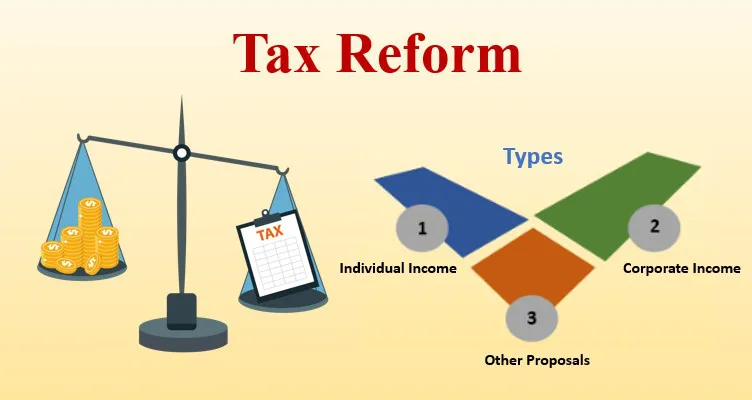Tax reform is a critical topic for businesses, especially corporations, as it directly impacts their financial planning, tax obligations, and bottom lines. As tax laws continue to evolve, it’s essential for corporations to stay updated on the latest changes. Tax reform updates for corporations in 2024 are significant, with several new provisions and adjustments that could affect everything from corporate tax rates to deductions and credits. In this comprehensive guide, we will explore the key tax reform updates for corporations in 2024, explain their implications, and provide tips on how businesses can navigate these changes.
Also Read: Sales Tax Nexus Criteria

Introduction to Tax Reform for Corporations
Tax reform updates for corporations play a pivotal role in shaping the economic landscape for businesses. Corporate tax reform often results in changes to tax rates, deductions, credits, and compliance requirements, all of which directly influence corporate strategies and decisions. In 2024, businesses are facing several important updates in corporate tax laws that require their attention.
The goal of corporate tax reform is usually to simplify the tax code, encourage investment, and promote economic growth. For many corporations, staying compliant with tax law changes while optimizing their tax position is a top priority. Understanding tax reform updates for corporations will help businesses maximize their opportunities and minimize risks.
Key Changes in Corporate Tax Rates
One of the most significant tax reform updates for corporations in 2024 relates to corporate tax rates. While the corporate tax rate in the U.S. was reduced to 21% under the 2017 Tax Cuts and Jobs Act (TCJA), some states and federal regulations are introducing new reforms that could impact how corporations are taxed.
- Changes in State Corporate Tax Rates: Many states have started to adjust their corporate tax rates. Some states, like New York and California, have introduced progressive tax structures for corporations, which could lead to higher taxes on larger corporations, while others are reducing their rates to attract businesses.
- Global Minimum Tax: The global minimum tax, as part of the OECD’s international tax reform, is set to affect large corporations that operate across multiple countries. Corporations with foreign income will need to stay compliant with new tax rules aimed at ensuring they pay a minimum level of tax, preventing tax avoidance strategies involving low-tax jurisdictions.
- Corporate Tax Rate Stability: Despite some states adjusting their rates, the federal corporate tax rate remains at 21%, though there have been discussions about raising it under the Biden administration. Keep an eye on potential changes to ensure your corporate tax planning strategies remain relevant.
Adjustments to Corporate Deductions and Credits
The tax reform updates for corporations in 2024 also bring changes to corporate deductions and credits, which can help businesses reduce their taxable income and offset tax liabilities. Here are some of the major updates in this area:
1. Research and Development (R&D) Deductions
The TCJA introduced a new rule requiring corporations to capitalize and amortize R&D costs over five years, starting in 2022. However, the new tax reforms in 2024 may include further changes to these provisions. Companies investing heavily in innovation should keep an eye on any potential tax benefits related to R&D activities.
2. Depreciation and Expensing Rules
Under the TCJA, corporations were allowed to take advantage of bonus depreciation, which allows businesses to deduct the full cost of qualified property in the year it was purchased. While bonus depreciation rules are still in place, they may phase out over time. Businesses should plan for the eventual reduction of this deduction and the return to more standard depreciation methods.
3. Tax Credits for Green Investments
The 2024 reforms emphasize sustainability with new green energy incentives. Corporations investing in renewable energy projects, energy-efficient buildings, or electric vehicle fleets may be eligible for expanded tax credits and incentives under these reforms.
4. Carrybacks and Carryforwards for Net Operating Losses (NOLs)
The reforms also bring back the ability for corporations to carry back net operating losses (NOLs), which was eliminated under the TCJA. In 2024, businesses may have the option to carry back NOLs for up to two years, providing opportunities for tax relief from prior years.
Also Read: State-Specific Use Tax Laws

The Impact of International Tax Reform
For multinational corporations, tax reform updates for corporations in 2024 include important changes in how income is taxed internationally. Under the TCJA, the U.S. adopted a territorial tax system, but global tax reform has introduced some changes that affect how businesses report and pay taxes on foreign income.
Global Minimum Tax
A major development in international tax reform is the introduction of the global minimum tax, which requires large multinational corporations to pay a minimum level of tax on their global earnings, even if those earnings are subject to low or zero tax rates in foreign jurisdictions. This reform is expected to curb base erosion and profit-shifting strategies and ensure that large corporations are paying fair taxes in the countries where they operate.
BEAT (Base Erosion and Anti-Abuse Tax) Updates
The BEAT provision, which imposes a tax on certain cross-border payments, is being updated in 2024 to tighten rules around tax avoidance strategies involving foreign subsidiaries. Corporations engaged in cross-border transactions should consult with their tax advisors to ensure compliance with the updated BEAT provisions.
New Rules for Small and Medium Enterprises
While much of the focus in tax reform tends to be on large corporations, there are also updates that affect small and medium enterprises (SMEs). In 2024, new tax rules are designed to help SMEs compete with larger companies by providing additional tax incentives and deductions.
1. Section 199A Deduction
The Section 199A deduction allows pass-through entities to deduct up to 20% of qualified business income. Although the deduction was originally set to expire, the 2024 tax reform updates have extended it, benefiting small businesses and owners of pass-through entities like S-corporations and LLCs.
2. Simplified Tax Filing for Small Businesses
There are ongoing efforts to simplify the tax filing process for small businesses. Some new reforms in 2024 aim to reduce administrative burdens and make it easier for small corporations to comply with tax laws.

How Corporations Should Prepare for 2024 Tax Changes
With all the tax reform updates for corporations in 2024, it’s crucial for businesses to prepare in advance. Here are some practical steps corporations should take:
- Review Corporate Tax Structure: Consider whether your current corporate structure is still the most tax-efficient. Revisit decisions such as operating as an S-corporation or LLC versus a C-corporation in light of the new reforms.
- Update Financial Projections: Make adjustments to your financial forecasts and tax planning strategies, accounting for changes to deductions, credits, and tax rates.
- Consult with Tax Advisors: Given the complexity of tax law changes, it’s highly recommended to consult with tax professionals who can help ensure compliance and maximize savings.
- Monitor State and Local Tax Changes: In addition to federal tax changes, don’t overlook any state-specific tax reform updates that may affect your business.
Frequently Asked Questions (FAQs)
1. What is the corporate tax rate in 2024?
The federal corporate tax rate remains at 21% in 2024. However, state corporate tax rates may vary, and some states may introduce progressive tax rates.
2. How will the global minimum tax impact corporations?
The global minimum tax ensures that multinational corporations pay a minimum level of tax on their international income, reducing the incentive to shift profits to low-tax jurisdictions.
3. Will small businesses benefit from the new tax reforms?
Yes, the 2024 tax reforms include measures that benefit small businesses, such as extended deductions and simplified filing processes.
4. What deductions are available to corporations in 2024?
Corporations can take advantage of deductions related to research and development, depreciation, and energy-efficient investments. Additionally, the carryback of NOLs is allowed under the new reforms.
5. How should corporations prepare for tax reforms in 2024?
Corporations should review their tax structures, update their financial projections, and consult with tax advisors to ensure compliance and optimize their tax strategy.
Conclusion
Staying informed about tax reform updates for corporations in 2024 is crucial for businesses aiming to optimize their tax strategy and remain compliant. From changes in corporate tax rates to new deductions, credits, and international tax rules, these updates present both opportunities and challenges. By understanding the key provisions of the new reforms and consulting with tax professionals, corporations can navigate the complexities of tax reform and ensure that they are well-prepared for the year ahead.